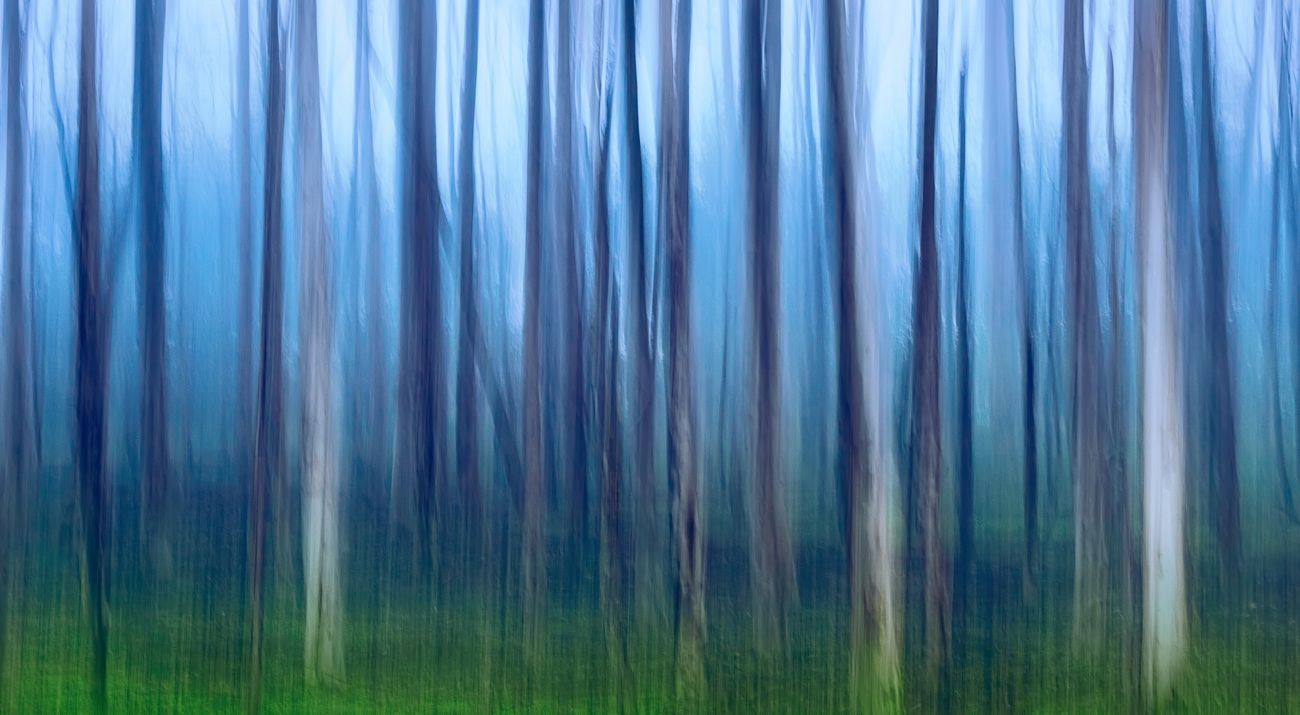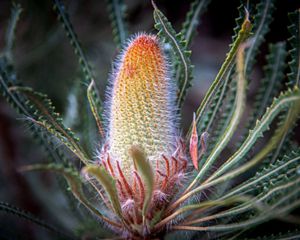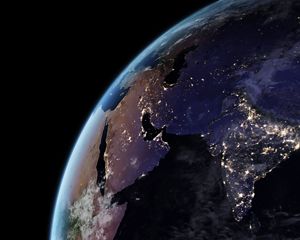2023 Nature Writing Prize Winners
The Winners of the 2023 Nature Writing Prize have been announced. Congratulations to Connor Tomas O’Brien who took out the $7500 major prize for his essay 'The Cryptids' and Lily Chan who received the Rosina Joy Buckman Award, a $1000 prize for highly commended essay, 'The Golden Age'.
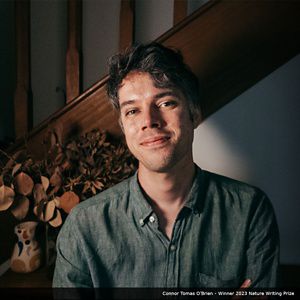
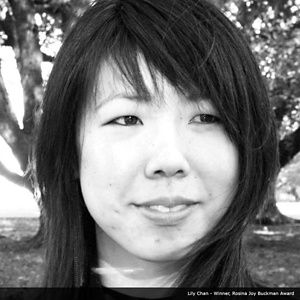
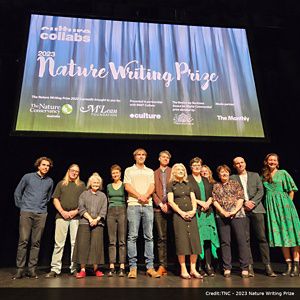
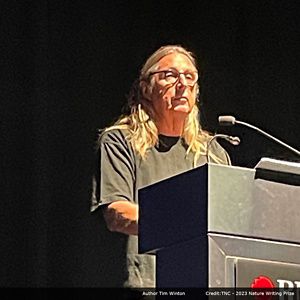

Connor Tomas O'Brien: Connor Tomas O'Brien © Connor Tomas O'Brien

Lily Chan: Lily Chan © Lily Chan

2023 Nature Writing Prize : 2023 Nature Writing Prize Winner Announcement Event. © TNC Australia

Author Tim Winton: Author Tim Winton, the keynote speaker at the 2023 Nature Writing Prize event © TNC Australia
About the 2023 Competition
-
See the keynote presentation by Tim Winton here.
Join us for a special evening to celebrate the 2023 winner announcement and see who will be awarded the $7,500 prize for their winning essay in the genre of ‘Writing of Place’, with a keynote presentation from author and passionate conservationist, Tim Winton.
Wednesday 22nd November 2023, 7pm-9pm
RMIT’s The Capitol,
113 Swanston St, Melbourne VIC
Keynote Presenter: Tim Winton
Tim Winton is the author of 29 books. Listed as a National Living Treasure, few other Australian writers have had such a broad-ranging and far-reaching cultural impact, from the arts and sciences, to environmental education, and conservation policy. In June 2023, Tim Winton received an Order of Australia (AO) for distinguished service to literature as an author and novelist, to conservation, and to environmental advocacy.
The event is proudly brought to you by The Nature Conservancy Australia and has been made possible thanks to the vision, and a generous donation, from The McLean Foundation, which promotes and celebrates the literature of nature and literature in nature in Australia. -
'Writing of Place'
-
Essay between 3,000 and 5,000 words
-
$7,500 will be awarded to the winning author.
The winning writer will be announced at a very special event in Melbourne in November 2023, featuring keynote speaker Tim Winton.
They will also be offered for publication, with the possibility of being published in The Monthly at the discretion of Schwartz Media's editorial team.
An additional author receiving a Highly Commended Prize - the Rosina Joy Buckman Award, a $1,000 prize, made possible thanks to the generous support of Life at Springfield.
The prize is open to Australian citizens and permanent residents. Participants will need to pay an entry fee of $25.
Read the full Terms & Conditions.
-
The competition’s judges are novelist, essayist and editor Ashley Hay and writer and environmental historian Cameron Muir.
They will award the prize to an Australian writer whose entry is judged to be of the highest literary merit and which best explores his or her relationship and interaction with some aspect of the Australian landscape.
Ashley Hay
Ashley works as a writer, editor, facilitator and mentor and is based in Brisbane. Between 2018 and 2022, she was the editor of the Griffith Review where she curated, commissioned and composed sixteen editions of Australia's leading quarterly of great writing and new ideas. Learn more about Ashley Hay.
Cameron Muir
Cameron's essays and features have appeared in Griffith Review, Meanjin, Inside Story, Overland, The Guardian, Australian Book Review, The Canberra Times and Best Australian Science Writing, among others. He has been awarded the Griffith Review Emerging Writers’ Prize, an Australian Society of Authors Mentorship (with Bruce Pascoe), a Griffith Review Contributor’s Circle Varuna Fellowship, shortlisted for the 2019 Bragg Prize for Science Writing and was a finalist in the 2019 Eureka Prizes for Science Journalism. Cameron has a PhD in environnmental history from the Australian National University. Learn more about Cameron Muir.
The Nature Writing Prize 2023 is proudly brought to you by The Nature Conservancy Australia and The McLean Foundation.
The Rosina Joy Buckman Award for Highly Commended essay, prize donated by: Life at Springfield
Presented in partnership with: RMIT Culture
Media partner: The Monthly

Previous winners
In 2021, Gregory Day was awarded the Nature Writing Prize 2021 Winner, for his essay The Watergaw.
Gregory Day is a novelist, poet, essayist and musician from the Eastern Otways region of south-west Victoria. He is a winner of the Australian Literature Society Gold Medal, the Elisabeth Jolley Prize, and his latest novel, A Sand Archive, was shortlisted for the 2019 Miles Franklin Award. In 2020 Gregory received the prestigious Patrick White Award for his ongoing body of work.
The announcement event featured an interview between Ashley Hay, then Editor of the Griffith Review, where the essay was published, in conversation with Gregory.
Gregory’s essay was chosen by judges Tara June Winch and Geordie Williamson, out of almost 140 pieces of writing received in the last competition.
The judging process was completely anonymous. Each judge read one half of all essays received, then from each batch they choose a longlist (usually 10 essays each judge) and swapped these with their counterparts. A shortlist is chosen from these, of five essays in total, with one winner and one highly commended writer agreed by both.
Of Gregory’s piece The Watergaw, judge Tara June Winch said: “…striking for its nuance and accomplishment in expressing nostalgia, and the language of belonging to a place. A beautiful and subtle work.”
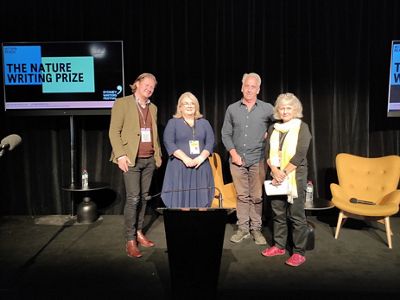
Other 2021 prize recipients
-
Michael Bradley is an ecologist based in North Queensland. He studies how rivers, forests and reefs support diverse communities of fish, and how they in turn support people through rich and varied fisheries. Michael has worked across the tropical landscapes of the Indo-Pacific for more than ten years, with a focus on northern Australia and Papua New Guinea.
He is a lecturer and research scientist at James Cook University, where he works with government and non-government organisations to better manage coastal ecosystems. In his first piece of nature writing, Crocodile Country, Michael grapples with working alongside animals that see us as prey, and the very real possibility of becoming part of the food-chains he studies.
Judge Tara June Winch of Bradley’s work said “…written with depth and a strong literary quality, investigating predator and prey in the north.”
-
Marian McGuinness is a Sydney-based freelance writer. From the Antarctic to the Arctic; from skull-riddled catacombs to ice cathedrals; from French wine caves to opal-bearing tunnels.
Marian’s interest in landscape and culture has seen her award-winning travel stories bunker down in major Australian newspapers, magazines and anthologies. Her recent story launched BBC Travel’s latest series, Nature's Curiosities.
-
Read Twelve and a Half Kilometres of Road.
Jenny Sinclair is a Melbourne writer. Her work has appeared in Griffith Review, Meanjin, Best Australian Stories, The Age, Island, Verandah, The Lifted Brow, The Big Issue and on ABC radio. Her non-fiction books are Much Ado About About Melbourne (2015) and A Walking Shadow (2012). She has been on staff at The Age and has written for a wide variety of publications. She holds a PhD in creative writing from the University of Melbourne, currently teaches writing at the university and was the co-winner of the 2019 Nature Writing Prize.
She lives and works on Wurundjeri and Dja Dja Wurrung land, with frequent excursions to the traditional country of the Djab Wurrung.
-
Dave Witty is an emerging writer, currently finishing a book on the storytelling power of trees. He moved to Melbourne in 2014 after spending several years living in Central Queensland where, among the gaunt eucalypts of the Peak Ranges, he developed his love of the Australian landscape. An urban planner during the day, Dave enjoys leaving the city behind at the weekend and exploring the bush. He also volunteers for the Hobsons Bay Wetlands Centre.
Judge Tara June Winch of Witty’s work said “…an informative enquiry into Queensland’s history of slavery and bondage on the sugarcane fields, written with gentle meditative control.”
